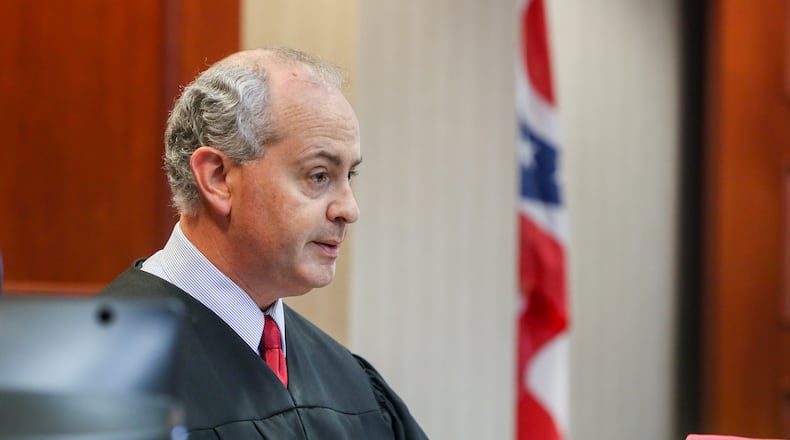The legal bills to defend the case total $304,315 and continue to mount. Of the current total, county taxpayers have paid the county’s $100,000 deductible. The bills cover Woeber’s legal fees through the seventh day of trial.
It has been nearly six years since Edelstein sued Stephens in federal court, alleging he fired her for being Jewish and ruined her career. The jury awarded $835,000 in back pay, $250,000 in compensatory damages and $35,000 in punitive damages.
“Reasonable minds could reach but one conclusion based on the evidence presented at trial: Judge Stephens’ termination of Ms. Edelstein had nothing to do with her request for time off, or the fact that she was Jewish (as evidenced by the fact the jury found for Judge Stephens on the Equal Protection and state law discrimination claim),” Woeber wrote.
Woeber added: “Because her entire recovery rests on the jury’s First Amendment retaliation finding, Edelstein should take nothing against Judge Stephens. Even if the jury’s First Amendment retaliation finding is sustained, the back pay award should be reduced in accordance with the evidence, and the punitive damages award must be set aside as no evidence was presented at trial that would support a finding of malice.”
Edelstein filed her response to the motion Friday, saying Barrett rarely grants new trials and quoted a citation from the 6th Circuit Court of Appeals, “a principle that strikes very deep is that a new trial will not be granted on grounds not called to the court’s attention during the trial unless the error was so fundamental that gross injustice would result.”
“This high standard for a new trial is likely due to the importance to the system of justice in allowing a jury of regular citizens to evaluate evidence and determine justice for its fellow citizen,” Edelstein wrote. “This is how a community standard for justice, for right and wrong, is created. Rightfully so, courts should limit the instances where a sole judge is allowed to insert his view of the case for that of a unanimous jury verdict from eight individuals.”
Edelstein filed the $1 million lawsuit against Stephens, the county, Butler County Prosecutor Mike Gmoser and Chief Assistant Prosecutor Dan Ferguson in 2017, claiming Stephens fired her for wanting to take off eight Jewish high holy days and saying the men bad-mouthed her, destroying her career.
She also claimed the county’s policy of allowing Christians to have Christmas off without taking a vacation day is discriminatory. The federal court dismissed the county, Gmoser and Ferguson from the case in 2020.
Woeber is also quibbling over the $835,000 award for back pay because Edelstein got another job with Wood County Prosecutor Paul Dobson. She eventually lost that job.
“Plaintiff’s accrual of lost wages, in the form of back pay, should have been tolled as of the date of her employment at Wood County, as she lost that opportunity due to her own egregious misconduct,” Woeber wrote. “The jury’s back pay award included five years after Edelstein’s Wood County resignation and put her in a much better position than she would have been if she had not been terminated by Judge Stephens.”
Edelstein is arguing Woeber never challenged her evidence regarding back pay.
“Defendant’s counsel had an opportunity to object to the damages summaries, was asked by the judge if there was an objection and defendant’s counsel stated they did not object to that evidence,” so she can’t dispute it now, Edelstein argued.
Woeber challenged the punitive damages claim as well, but Edelstein argued the award was small and within the jury’s purview.
“A challenge on the issue of damages will only support a new trial if the damages were ‘entirely disproportionate to the injury’,” she wrote. “Furthermore, a punitive damages award is only excessive if it ‘shocks the conscience.’ Punitive damages are to punish a party. Obviously the jury felt that defendant committed a wrong and that a punishment of $35,000 was warranted.”
Woeber also asked the judge to stay payment of the judgment until after he rules on her latest motions, because Stephens believes he will prevail and will be harmed if he has to pay now. Edelstein said it will be difficult for Stephens to win a new trial and “plaintiff most certainly will be damaged with another year or two waiting for justice and compensation.”
Court documents show if Stephens fails his motions, he will appeal. Edelstein already filed a notice of appeal earlier this month, claiming among other things the county should still be on hook — and presumably financially responsible — in the lawsuit.
A big question in the case is whether Stephens or county taxpayers would be responsible for the $1.1 million judgment if it stands. Woeber argued in a mid-trial motion Stephens is technically not a county employee so “vicarious liability” doesn’t apply to the county.
“A state court judge in Ohio is not hired by, nor can he or she be fired by, the county or any agency of the State. Judge Stephens was voted in by the electorate and cannot be removed from office by another governmental body. Further, the county had no control over assigning, hiring, and firing of Judge Stephens’ personal staff,” Woeber wrote.
Butler County Prosecutor Mike Gmoser has said since Edelstein has raised the vicarious liability issue the courts will determine who pays.
About the Author

